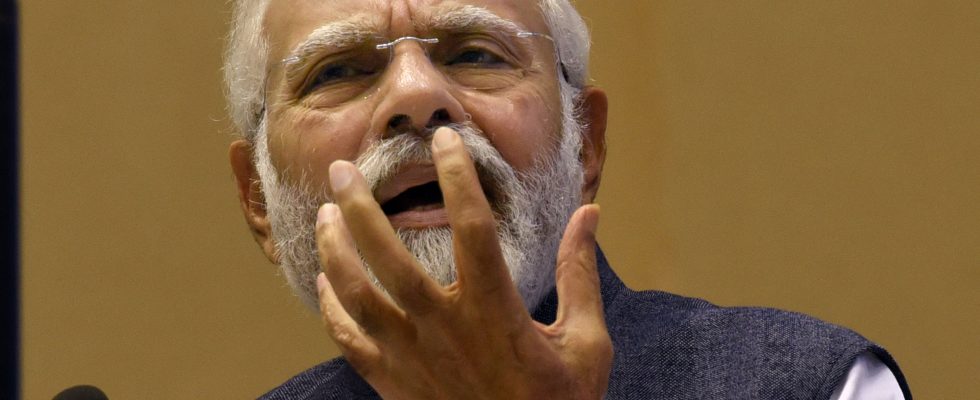Like two old friends. This is how Joe Biden and Narendra Modi appeared, embracing each other on the sidelines of the G7 summit in Hiroshima, where the Indian Prime Minister had been invited by his Japanese counterpart Fumio Kishida. Images that have been widely relayed by Indian television. A few days later, in Sydney, during a gathering of the diaspora of the subcontinent in honor of Modi, the head of the Australian government Anthony Albanese had even compared the popularity of his guest to that of Bruce Springsteen. “Modi is the boss,” he said.
Never has India been so courted. And this is not to displease Narendra Modi, present on all fronts to make New Delhi essential on the map of world diplomacy. After his state visit to Washington on June 22 to deepen ties between the two countries, the Indian No. 1 will be welcomed with great fanfare in Paris as guest of honor at the July 14 parade.
And yet, the Hindu nationalist is far from espousing all the causes of his hosts. Historical ally of Moscow, its main supplier of arms and oil, New Delhi has never condemned Russian aggression against Ukraine. Refusing to choose its camp, India continues to maintain its balancing act in this war, while pursuing its rapprochement with the West, which is betting on the future development of its market and its rivalry with Beijing. “Some Western countries may not like New Delhi’s attitude towards Ukraine, but India represents a counterbalance to China in the Indo-Pacific,” observes Harsh Pant, vice president of the group of reflection Observer research Foundation, based in New Delhi. India is notably one of the pillars of the Quad, an alliance also bringing together the United States, Australia and Japan, intended to counter the rise of China in the region. Moreover, relations between New Delhi and Beijing have soured since the bloody clash between their armies in June 2020 along their disputed border in the Himalayas.
“A power of the 21st century”
“At the Quai d’Orsay, India is less fearful than China and Russia, and above all, it is able to talk to everyone, says a French diplomat posted in Asia. She understood that a logic of block was at work and positioned itself in the midst of the great powers, but also as a link between North and South.” Seeing itself as a voice for the Global South, New Delhi organized a virtual summit in January 2023 bringing together more than a hundred developing countries.
Indian foreign policy reflects the theory of “multi-alignment”, developed by the Minister of Foreign Affairs, Subrahmanyam Jaishankar, a brilliant diplomat and skilful lieutenant of the Prime Minister. It consists in exploiting the contradictions of the world to serve the interests of India. And make it a power of the 21st century without which nothing can be done.
Unhindered by this great ideological gap, Narendra Modi will make a 180 degree turn between his visits to the United States and France to chair, at home, the summit of the Shanghai Cooperation Organization (traditionally aimed at countering the western influence). The Hindu nationalist is expected to host Chinese President Xi Jinping, Russian Vladimir Putin, Pakistani Prime Minister Shehaz Sharif and other Central Asian leaders.
This intense diplomatic sequence will end with a bang in September with the G20, of which India holds the presidency this year. “This gives us de facto status, rejoices Manjeev Singh Puri, India’s former ambassador to the European Union. We are now the most populous country in the world, we are going to become the world’s third largest economy and we are a democracy: it is in the interest of the rest of the world to interact with us!”
A strategy that pays off
Narendra Modi intends to derive electoral dividends from this international recognition. To welcome the G20 (which takes place a few months before the general elections of 2024), the Prime Minister did not even hesitate to maneuver to exchange his turn with Italy and Indonesia. From Bombay to New Delhi via Bangalore, it is impossible to escape the G20 posters flanked by Modi’s face, presenting India as the “mother of democracy”. “For Indians, India’s international stature is symbolized by Narendra Modi and when they see these posters, they feel that their country has succeeded,” said Manjeev Singh Puri.
India would become almost arrogant. The eloquent Subrahmanyam Jaishankar made a habit of putting every opponent in his place, refusing to take lessons. While the head of European diplomacy, Josep Borrell, considered that the import of refined products into India from Russian oil should be subject to sanctions, the Minister of Foreign Affairs curtly invited him to reread the texts. “My understanding of the Council of the European Union regulations is that if Russian crude is substantially processed in a third country, it is no longer considered Russian,” he replied.
This strategy is paying off. Faced with the worrying excesses of Indian democracy, which sees freedom of the press undermined, the proliferation of speeches and hate crimes against minorities, but also the bringing to heel of opponents, Westerners remain silent. Worse, they don’t hesitate to roll out the red carpet for him.
